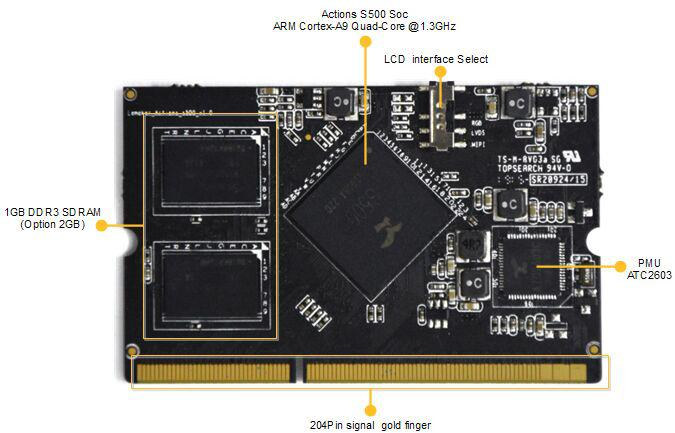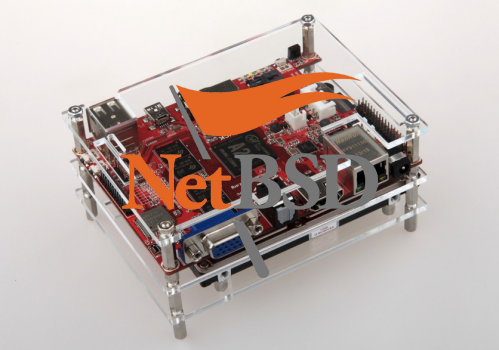LeMaker, better known for the Banana Pi, has recently unveiled three boards at an event in China: LeMaker Bass – a 96Boards compliant board powered by Actions Semi S900 quad core processor LeMaker Piano – An industrial grade single board computer based on Freescale i.MX6 Solo, Dual or Quad LeMaker Guitar – A low cost board powered by Actions Semi S500 processor There are plenty of Freescale i.MX6 industrial boards on the market, and LeMaker Bass appears to be the previously announced Bubblegum-96 board now supported by Lemaker, so I’m going to focus on LeMaker Guitar in this post. It’s good to see at least one company dropped the “fruit + pi” theme for their new boards… The Guitar board is comprised of a system on module (SoM), and a baseboard. The SoM comes with the following technical specifications: SoC – Actions Semi S500 quad core Cortex A9r4 processor @ […]
Snappy Ubuntu Core is an IoT Linux Distribution for ARM and x86
Canonical has announced a version of Ubuntu specifically designed for IoT devices running Linux, with a low hardware requirements, and a new package manager called snappy, replacing apt-get for this version of Ubuntu, which provides simpler, faster, and more reliable updates, stronger security, and allows roll-backs in case something goes wrong. Easy firmware updates are something missing in most connected device, which means they are more vulnerable to potential hackers, but with snappy security updates should be able to make it regularly, so that if something like heartbleed occurs again, you know your router, home automation gateway, connected washing machine, or robot will be soon patched automatically. Let’s go through the hardware requirements first: Processor – 600 MHz processor (ARMv7 or greater, or x86) System Memory – 128 MB RAM or greater (The system itself uses 40 MB RAM) Storage – 4GB flash / storage for factory reset and system […]
NetBSD 7.0 To Support Multi-Core ARM Processors from Allwinner and Freescale
NetBSD is an open source Unix-like Open Source operating system running on a wide range of platforms, from servers and desktop systems to embedded devices. The operating system has supported ARM since 1996, with more recent ports for ARM Cortex A8 and Raspberry Pi, but until recently it did not support SMP (Symmetric multiprocessing) to support more than one core. But NetBSD has now fixed this “anomaly” and the following Allwinner A20/A31 and Freescale i.MX6 boards are now supported: Banana Pi (BPI) Cubieboard 2 (CUBIEBOARD) Cubietruck (CUBIETRUCK) Merrii Hummingbird A31 (HUMMINGBIRD_A31) CUBOX-I NITROGEN6X You can give it a try on Allwinner boards by creating an SD card following instructions on NetBSD / Allwinner Wiki. There does not seem to be documentation for the Freescale boards yet. If Allwinner documentation is up-to-date, this is a headless image, as framebuffer, HDMI, etc… are still in to TODO list, but Gigabit Ethernet and […]
Banana Pro Allwinner A20 Development Board Looks Similar to Raspberry Pi Model B+
Banana Pi development board was launched about half year ago with Raspberry Pi model B form factor, but with more powerful Allwinner A20 dual core processor, and extra interfaces such as SATA. A few months later, the Raspberry Pi foundation launched Raspberry Pi Model B+ with pretty much the same specifications, but a different board layout and connector placement, and LeMaker has now designed a new version of the AllWinner A20 development board called “Banana Pro” that’s somewhat similar to R-Pi B+ board layout, with a 40-pin header, and similar connector placement, minus a few differences, such as using two USB ports instead of four, and the addition of a Wi-Fi module. Banana Pro specifications with differences against Banana Pi highlighted in bold: SoC- Allwinner A20 dual core Cortex A7 processor @ 1 GHz with Mali-400MP2 GPU System Memory – 1 GB DDR3 Storage – micro SD card slot, SATA […]






